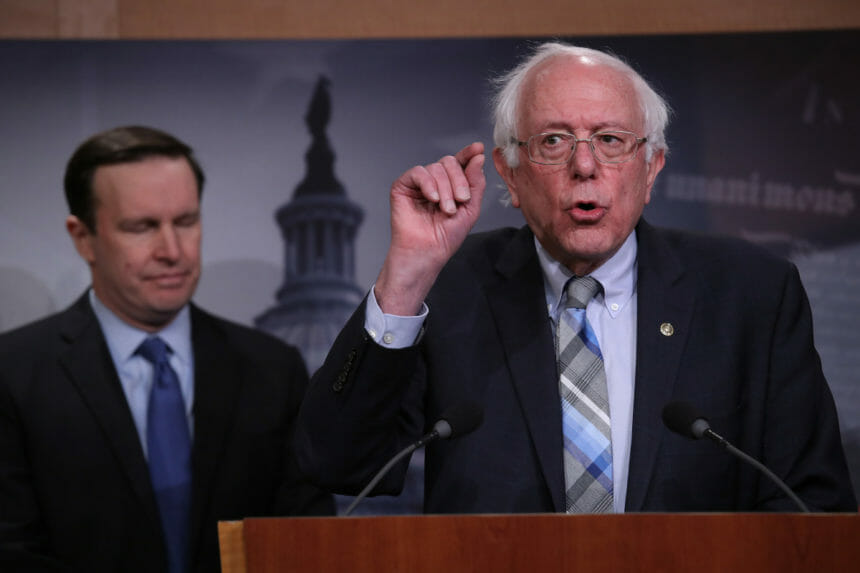Sen. Bernie Sanders said he’ll oppose President Joe Biden’s National Institutes of Health (NIH) director nominee, Dr. Monica Bertagnolli, until the White House puts forth a solid plan to further reduce drug prices.
Since Sanders chairs the Senate Health, Education, Labor, and Pensions (HELP) Committee, the Biden administration won’t be able to officially confirm Bertagnolli’s appointment as director without his support.
Sanders said he’s willing to play hardball and use his leverage as the panel chair to advance his policy goals.
“I will oppose all nominations until we have a very clear strategy on the part of the government… as to how we’re going to lower the outrageously high cost of prescription drugs,” Sanders told The Washington Post in an interview this week.
The announcement highlights a long-debated issue: the use of taxpayer money to help fund private companies’ medical research and development, while the companies later charge patients exorbitant prices.
That sentiment was further underscored in a recent report out of the HELP Committee arguing that while the federal government invests some $54 billion to support medical research, it asks “for nothing in return for its investment” from industry.
The report examined the prices of drugs that received federal funding to develop, and found that the average price of new therapies with help from the NIH was $111,000.
“U.S. taxpayers virtually always pay more than people in other countries for treatments that NIH scientists helped invent,” the report stated.
Additionally, the report compared the U.S. prices of 15 major drugs to international prices and found major discrepancies. Bluebird Bio’s cancer drug Abecma, for example, is priced at $457,000 in the U.S. and about half that ($260,000) in Germany.
Price differences are apparent even on the smaller scale, with HRA Pharma’s emergency contraception Ella costing $40 in the U.S. compared to just $10 in France.
To help address this issue, Sanders wants the NIH to incorporate something known as “reasonable pricing” – a clause in the agency’s contracts with pharma companies that requires reasonable pricing for treatments that are developed with the help of NIH scientists.
While the “reasonable pricing” clause existed in NIH contracts with pharma companies starting in 1989, the agency removed it in 1995 following industry pushback.
“The average price of new treatments that NIH scientists helped invent over the past 20 years is now more than ten times the price that led NIH to first introduce a reasonable pricing clause in 1989,” the report noted. “Pharmaceutical corporations should not be allowed to monopolize or profiteer from publicly funded research.”
The report highlighted a recent example of this practice, a hemophilia B gene therapy developed by uniQure, known as Hemgenix. Hemgenix’s $3.5 million price tag won it the label of the “world’s most expensive drug.”
The committee argues that Hemgenix “exists because of decades of public investment,” with the therapy stemming from research at St. Judge Children’s Research Hospital and the NIH.
CSL Behring, uniQure’s marketing partner that priced the drug, told STAT News in a statement that Hemgenix emerged from “more than a decade of private sector investment” and that the NIH received “significant royalties.”
“This is an example of a healthy innovation ecosystem between the private sector and the government which resulted in paradigm-shifting innovation to advance clinical care and create savings for the overall healthcare system,” CSL Behring continued.
Meanwhile, the White House’s response to The Washington Post pointed to the Inflation Reduction Act passed last year as a sign that Biden is making moves in line with Sanders’ push for lower drug costs.
The Biden administration also stated that the bill was “the most consequential law addressing the high cost of prescription drugs,” but did not promise any future legislation on the matter.
Still, there have been continued efforts in Congress and by the federal government to inch forward on drug pricing.
Recently, the Centers for Medicare and Medicaid Services introduced a proposal that would strengthen the Medicaid Drug Rebate Program, which requires pharma companies to pay rebates when their drugs are covered by the program.
Also, following an increased push against pharmacy benefit managers (PBM), the Senate Committee on Finance this week introduced a bipartisan package, the Patients Before Middlemen Act, which would prohibit PBM compensation based on a drug’s price if the PBM is contracting with a Medicare Part D plan.







